 The Kampo medicine called maoto consists of ephedra, apricot kernel (Prunus armeniaca, Rosaceae), cinnamon, and licorice.
The Kampo medicine called maoto consists of ephedra, apricot kernel (Prunus armeniaca, Rosaceae), cinnamon, and licorice.
Researchers from Shimane University Hospital, in Japan formulated a suppository of maoto and use it to lower fever in infants and children. Continue reading Controlling fever with maoto suppositories →
 Yokukansan, a traditional Japanese medicine (kampo) used to treat behavioral and psychological symptoms of dementia, was studied by researchers from the University of Tsukuba, in Ibaraki, Japan. Continue reading Yokukansan to treat dementia →
Yokukansan, a traditional Japanese medicine (kampo) used to treat behavioral and psychological symptoms of dementia, was studied by researchers from the University of Tsukuba, in Ibaraki, Japan. Continue reading Yokukansan to treat dementia →
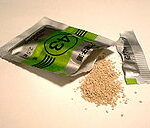 Rikkunshito is a popular Japanese traditional medicine that’s used in Japan to treat various gastrointestinal disorders.
Rikkunshito is a popular Japanese traditional medicine that’s used in Japan to treat various gastrointestinal disorders.
Researchers from Osaka Medical Center, in Japan studied the effects of rikkunshito on delayed gastric emptying in handicapped patients. Continue reading Rikkunshito to treat delayed gastric emptying →
 Â Researchers from Aichi Medical University School of Medicine, in Japan studied the potential for the Kampo medicine, byakkokaninjinto (aka BN), to alter the metabolism of 2 antibiotics (ciprofloxacin (Cipro) and tetracycline). Continue reading Does byakkokaninjinto interact with antibiotics? →
 Researchers from Aichi Medical University School of Medicine, in Japan studied the potential for the Kampo medicine, byakkokaninjinto (aka BN), to alter the metabolism of 2 antibiotics (ciprofloxacin (Cipro) and tetracycline). Continue reading Does byakkokaninjinto interact with antibiotics? →
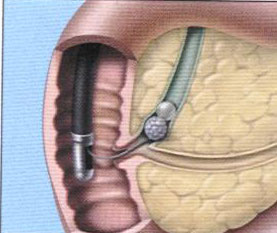 Endoscopic retrograde cholangiopancreatography (ERCP) is used to diagnose and treat conditions of the bile ducts, including gallstones, inflammatory strictures (scars), leaks (from trauma and surgery), and cancer.
Endoscopic retrograde cholangiopancreatography (ERCP) is used to diagnose and treat conditions of the bile ducts, including gallstones, inflammatory strictures (scars), leaks (from trauma and surgery), and cancer.
Researchers from Chiba University in Japan used shakuyaku-kanzo-to (TJ-68) to suppress spasms of the small intestine during ERCP procedures. Continue reading Herbal alternative to control intestinal spasm →
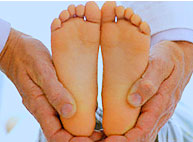 Palmoplantar hidrosis (aka hyperhydrosis) is excessive sweating from the palms and soles, which can be an embarrassing and disabling condition.
Palmoplantar hidrosis (aka hyperhydrosis) is excessive sweating from the palms and soles, which can be an embarrassing and disabling condition.
In this article, Dr. Fumino Ninomiya from Japan reports that a Kampo medicine, Shigyaku-san (Sini san, TJ-35: Tsumura & Co.), was associated with improvement of palmoplantar hidrosis. Continue reading Treating sweaty palms (and feet) with Kampo medicine →
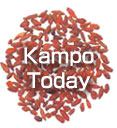 Researchers from The University of Tokushima in Japan initially used Kampo to reduce the side effects and improve the quality of life of patients with uterine cervical cancer being treated with radiotherapy and chemotherapy. Continue reading Survival in cancer patients receiving Kampo therapy →
Researchers from The University of Tokushima in Japan initially used Kampo to reduce the side effects and improve the quality of life of patients with uterine cervical cancer being treated with radiotherapy and chemotherapy. Continue reading Survival in cancer patients receiving Kampo therapy →
 Hochu-ekki-to (TJ-41) is an herbal medicine that contains a mixture of 10 medicinal plants (listed below). It’s produced by Tsumura Co., Ltd. in Tokyo, which specializes in selling Kampo medicine — the adaptation of traditional Chinese medicine to Japanese culture.
Hochu-ekki-to (TJ-41) is an herbal medicine that contains a mixture of 10 medicinal plants (listed below). It’s produced by Tsumura Co., Ltd. in Tokyo, which specializes in selling Kampo medicine — the adaptation of traditional Chinese medicine to Japanese culture.
In this study, the use of topical medicines (steroids and/or tacrolimus [Protopic]) decreased when patients with atopic dermatitis took Hochu-ekki-to. Continue reading Kampo medicine to treat atopic dermatitis →
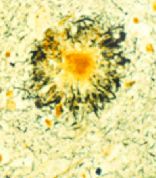 The most prominent neurochemical change in patients with Alzheimer’s disease is a deficiency of choline acetyltransferase, the enzyme responsible for the synthesis of acetylcholine.
The most prominent neurochemical change in patients with Alzheimer’s disease is a deficiency of choline acetyltransferase, the enzyme responsible for the synthesis of acetylcholine.
Polygalae radix is thought to be a useful component of kami-untan-to because it increases the activity of choline acetyltransferase. This study evaluated this Japanese herbal (kampo) medicine in people with Alzheimer’s disease. Continue reading The effect of kihito extract granules in people with Alzheimer’s disease →
Complementary and Alternative Medicine: Fair, Balanced, and to the Point
![]() The Kampo medicine called maoto consists of ephedra, apricot kernel (Prunus armeniaca, Rosaceae), cinnamon, and licorice.
The Kampo medicine called maoto consists of ephedra, apricot kernel (Prunus armeniaca, Rosaceae), cinnamon, and licorice.
 Â Researchers from Aichi Medical University School of Medicine, in Japan
 Researchers from Aichi Medical University School of Medicine, in Japan  Endoscopic retrograde cholangiopancreatography (
Endoscopic retrograde cholangiopancreatography ( Palmoplantar hidrosis (aka hyperhydrosis) is excessive sweating from the palms and soles, which can be an embarrassing and disabling condition.
Palmoplantar hidrosis (aka hyperhydrosis) is excessive sweating from the palms and soles, which can be an embarrassing and disabling condition. Researchers from The University of Tokushima in Japan initially used Kampo to reduce the side effects and improve the quality of life of patients with uterine cervical cancer being treated with radiotherapy and chemotherapy.
Researchers from The University of Tokushima in Japan initially used Kampo to reduce the side effects and improve the quality of life of patients with uterine cervical cancer being treated with radiotherapy and chemotherapy.  Hochu-ekki-to (TJ-41) is an herbal medicine that contains a mixture of 10 medicinal plants (listed below). It’s produced by Tsumura Co., Ltd. in Tokyo, which specializes in selling Kampo medicine — the
Hochu-ekki-to (TJ-41) is an herbal medicine that contains a mixture of 10 medicinal plants (listed below). It’s produced by Tsumura Co., Ltd. in Tokyo, which specializes in selling Kampo medicine — the  The most prominent neurochemical change in patients with Alzheimer’s disease is a deficiency of choline acetyltransferase, the enzyme responsible for the synthesis of acetylcholine.
The most prominent neurochemical change in patients with Alzheimer’s disease is a deficiency of choline acetyltransferase, the enzyme responsible for the synthesis of acetylcholine.